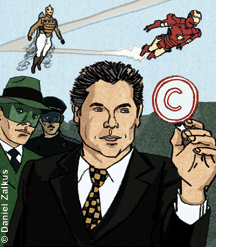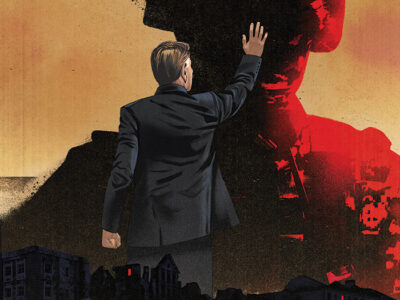
Class of ’86 | Every July, sandwiched between the myriad panels on how to break into comics, animation, and gaming at the San Diego Comic-Con, past the sea of streaming Supermen, Imperial Stormtroopers, and Na’avi in the hallways, you’ll find Michael Lovitz C’86 guiding audiences through a labyrinth of intellectual-property laws. It looks and sounds like any professional legal seminar—a jolly romp through trademarks, contracts, copyright ownership, and licensing. Except, perhaps, for the woman in the front row dressed as the Joker.
Lovitz is a Los Angeles intellectual-property attorney specializing in the comic-book, gaming, and graphic-novel industries. He is also an unabashed fanboy with an enviable comic-art collection who once co-owned a Philadelphia comic-book store, Amazing Comics, and boasts a personal library of 20,000 comics.
His passion and acumen for both arenas has attracted notable industry players. Clients of his Beverly Hills boutique agency, Lovitz IP Law (www.lovitziplaw.com), include Iron Man writer/artist Bob Layton, Green Hornet publisher Dynamite Entertainment, Image Comics’ co-founder Jim Valentino, the estate of The Rocketeer creator Dave Stevens, and The Twilight Sagafilms producer Summit Entertainment. For the last 17 years, he has presented his Comic Book Law School seminars (for which lawyer attendees earn California Continuing Legal Education credits) at Comic Con International in San Diego (SDCC), the country’s largest comic-book, pop- culture, and science-fiction convention. He’s also the author of The Trademark & Copyright Book: A Comprehensive Guide for Comic Book Creators, an intellectual-property guide—presented in comic-book form.
“Comic books are soap operas for guys,” says Lovitz. “They’ve got the old elements of an action-adventure radio program with emotional subplots like, ‘What happens if Lois Lane finds out who Clark Kent is?’ or ‘I stood up my girlfriend, because I was busy fighting Dr. Octopus.’ But what really attracted me were the creative ways the superheroes solved problems, which is what lawyers do.“
This once-escapist fare has now positioned Lovitz among those redefining ownership laws within this niche. Long dismissed as the bastard child of publishing, comic properties are now a multi-billion-dollar industry, thanks to films and video games. And because of the high financial stakes and copyright-law ambiguity, they are facing increasing legal scrutiny.
“Depending on the interpretation of copyright law, and how you determine ownership of content created by independent contractors, comic and gaming publishers may soon be open to a flurry of lawsuits,” says Lovitz. “It’s an area that’s not been litigated heavily, and many companies aren’t yet aware of the seriousness of the issue. But it stands to become a potential problem.”
Lovitz grew up in the Philadelphia suburb of Wyncote, where he and his older brother read copiously.
“My brother introduced me to comics just as he was outgrowing them, but they stuck with me even as I shifted my focus to fiction, especially science fiction,” he says. Although Lovitz’ father, Hyman W’51, was a pioneering attorney in the area of wrongful discharge, Lovitz had his heart set on working for NASA, and double-majored in astrophysics and English.
“By junior year, I’d hit the wall with more advanced elements of math and physics, and was deciding what to do after graduation. I enjoyed writing, performing [in Penn Singers], logic, and arguing. The practice of law had a lot of those elements—well, except the singing,” he laughs. “Plus, LA Law was one of the big shows at the time, so I thought, ‘I should look into this a bit more.’”
No knowledge is ever wasted. After graduating Temple University School of Law in 1989, Lovitz found that it was his undergraduate science degree that gave him an edge in landing his first legal job: working on scientific patents for a local intellectual-property firm. After a few years, he gravitated toward trademarks and copyrights, at a Philadelphia IP boutique and international Manhattan firm, before joining the Delaware office of Connolly Bove Lodge & Hutz in 2001, where he rose to partner. In 2006, he moved to its Los Angeles office, but left to join the LA-based Buchalter Nemer.
Last summer, after 21 years in practice, he decided to hang out own shingle.
“It was exciting, though slightly unnerving,” he says. “But it’s one of the best decisions I’ve made with my career.”
While his legal career was burgeoning, Lovitz remained fully and enthusiastically rooted in geekdom. Since 1989, he’d helped friends sell comic inventory and began networking at the conventions. At SDCC in 1993, a comic creator asked him to join her on a creators’ rights panel. The following year, SDCC tapped him for his own panel on basic intellectual-property law for comic creators. Largely due to Lovitz’ energy, exuberance, and interactivity, that panel has since grown into three 90-minute seminars, plus an hour-long “hot topics” panel.
“Most people think of Comic Con and comic books purely as entertainment, and not about the business or legal aspects” that Lovitz brings to the event, says David Glanzer, SDCC’s director of marketing and public relations. “Creators should think more about this kind of thing, especially now that many comic books are brought into film, TV, and multimedia. The panels are really popular and an invaluable tool for anyone breaking into or in the business.”
In 1995, Lovitz’s presentations attracted comic-book publisher Sirius Entertainment as a client, which later offered an unusual proposition: a comic-book version of his lectures.
“I thought they were crazy,” laughs Lovitz. “But the more we talked, the more I saw the project as a stroke of genius.” The 2001 result was The Trademark & Copyright Book, which has sold 7,000 copies and is paving the way for an expanded version covering infringements, licensing, and contracts.
“I first saw a copy in 2002 and thought it was brilliant,” says longtime client Bob Layton, who co-authored Iron Man’s iconic Demon in a Bottle storyline, and whose science-fiction film, The Helix, is now in development. “He used the very medium of his clients to explain a complicated and dry topic in a very succinct and entertaining way. I was so impressed that I wrote to him and said, ‘I want you to be my lawyer!’
“But he’s not just a lawyer—he’s a real die-hard comic fan, too,” adds Layton. “I never have to explain situations to him, because he totally understands how the comic or film business works. He has real enthusiasm for the things his clients are doing creatively, which really adds to his effectiveness as an attorney.”
Lovitz now stands to set legal precedent. He’s currently representing a comic creator embroiled in a complex dispute with Archie Comics and videogame makers Sega and Electronic Arts, turning on whether comic books are “work made for hire.” While he can’t go into the particulars of his case, it could, if successful, change the way comic-book freelancer contracts are structured.
Superheroes everywhere are holding their breath.
—Susan Karlin C’85




